“Pantelleria is a magnetic field,” discloses Asterix, a friend from France who, more than anyone else, expresses the genius and intemperance of this island.

Asterix is a free spirit “par excellence” and an important figure on the island since the early 1990’s.
“The secret of Pantelleria,“ he tells me, “is the extraordinary energy resulting from this magnetic field, a phenomenon generated by the endless volcanic activity of this island.”
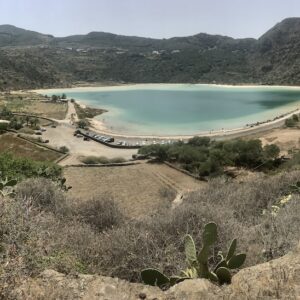
I met Asterix thirty years ago when he was looking for a place to stay with his girlfriend. He told me that he had specialized in staying in vacation homes during the periods when their owners were away, and that he had been previously living in a converted lighthouse in Malta. He asked me if he could live in my house, and offered to take care of its maintenance and to keep it in order.
I liked his “adaptive re-use” approach and agreed enthusiastically to his proposal.
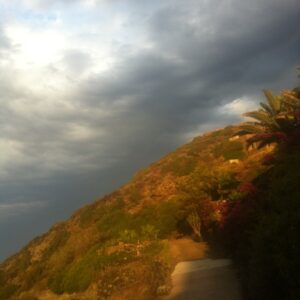
In those years, Asterix was writing a book on immortality, convinced to have found the secret to mock death. It was a fascinating subject that needed to be developed further and, accordingly, I spent many nights with him debating this topic, and trying to catch his strategy.
I love secrets and, even more, people with larger than life personalities, and Asterix was one of them.
But he liked red wine, and abundant toasts always accompanied our discussions on immortality. And since our meetings would last deep into the night, my mind used to get clouded before we had reached the conclusion. Ultimately, I was never able to learn his secret for becoming immortal.
He told me that in his previous life in Paris in the 1970’s, he had created a business that interpreted dreams, offering specific numbers that people would play via Minitel, a French online service accessible through the telephone. Minitel was the world’s most successful online service prior to the World Wide Web.
“It was a winning business,” Asterix said, “it made me rich fast, but because of the monopoly regime, the Government told us to shut it down.”
“But I refused!” he concluded, “and, in a few months, the Government forced my company into bankruptcy. From one day to the next I turned from being ‘independently rich’ to ‘independently poor’!”
I told him that this type of business is still alive and kicking in Naples by word of mouth.
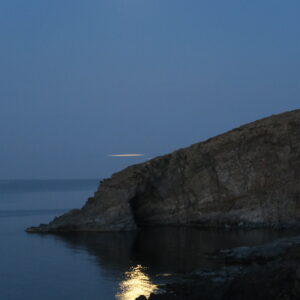
He confessed that this experience had taught him that life was too important to be wasted making money, and then he left France for Malta, where he began taking care of uninhabited summer residences. Seven years later he landed in Pantelleria.
Besides being intellectually brilliant, Asterix is an artist, a carpenter, a plumber, and an electrician, fiercely refusing any compensation, and performing all of the above trades on a non-profit base. But to live full time “off the system” is not an easy task because it goes counter-current to our capitalistic society. In Asterix’s case, this approach turned out to be even harder when his girlfriend brought into the world a wonderful blond baby.
Asterix wasn’t one to be dismayed and, always at the forefront, launched the first Internet site on the island that allowed private owners to directly sublet their summer houses to tourists. This was ten years before “airbnb”, and the project further expanded to cover most of Pantelleria’s tourism-related activities, producing a steady income.
Asterix’s general quarter is an off-the-grid pavilion completely built with recycled materials. Two solar panels and a small windmill provide the electricity he needs, while water is pumped from his neighbor’s cistern through to a 400-foot rubber hose.
When someone suggests that his pavilion could be considered illegal because of its location in an agricultural area, he explains that this is an “observatoire” and, as he talks, he presses a button activating two pistons energized by a windscreen wiper motor of a dismantled Citroen 2CV. Suddenly, as if by magic, the pavilion’s roof opens to disclose the sky and the stars.
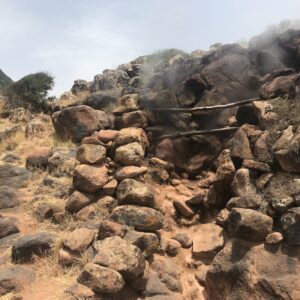
Two years ago, I saw Asterix in a former bowling alley turned into a coffee bar. He was aiming a movie camera at the owner of the place with a threatening attitude.
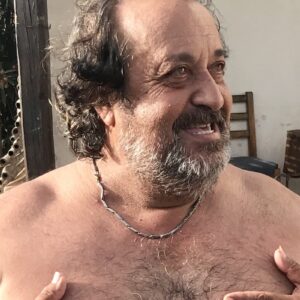
“Salvatore,” he was thundering, staring at him with his deep penetrating eyes topped with thick eyebrows. “What is the Universe for you?”
Salvatore, after a brief hesitation answered, “I am the Universe!”
I thought this exchange was emblematic of the existing conflict between globalism and localism. Salvatore had answered the same way as a New Yorker would, both victims of an insular complex that strengthens their belief of being always at the center of the world.
In Pantelleria most people are known by their nicknames, assigned by friends or foes to better highlight their personality, character and habits; the way these nicknames stick to their targets is ‘magnetic’, but finding them out is an insider’s job. One day, I sat with some locals at a local café and asked them to disclose some of these nicknames for me.
They quoted me a few:
“Mangiaforte” (strong eater), an extra large baker and gourmand
“Fatutto” (does everything), a multitask individual with endless trades, from baking pizza to selling real estate
“Panduro”, (hard bread), a rugged fisherman who munches stale bread during his long fishing sessions
“Sansone”, a scuba diving fisherman with an oversized body and an exceptional physical strength
“Zorro”, a fisherman who, having fallen in love with the movie character, was often wearing a black mask
“Gricchianespole” (medlar cracker), a strongman who has the habit of cracking medlars with his bare hands
“Stoccavacca” (cow breaker), a farmer who once broke the backbone of his cow with an affectionate slap
“Terremoto” (earthquake), a baker who was particularly wild in his youth
“Cafuncella” (rustic girl), a young female with primitive habits
“Filusera”, (complainer, in local dialect), a lady who complains nonstop
Every one of the above nicknames characterizes a distinct individual who could easily play a part in a Fellini movie. What they all have in common is the unusual island’s energy generated by its natural magnetic field.

As I was leaving, a corpulent individual riding a tiny scooter overtook us.
“Who is he?” I asked, “Il Cileno” (i.e. the Chilean), they replied.
“Why is that?” I questioned.
“Because, when he was 17-year old, he embarked on a ship to Chile, where he found work in a large vineyard producing a famous Cabernet. This farm was hundreds of miles from Santiago, the capital city, and the owner of the vineyard personally escorted his new laborer by plane.”
“The boss then returned to Santiago, leaving him alone with the task of attending to the vineyard during winter, and getting it ready for the following season.”
“Our man pruned the plants as he had learned in Pantelleria, where a rather drastic method is necessary to strengthen the vines and defend them from the strong wind.“
“When, after the winter months the owner returned, he was shocked to see that his vines had almost disappeared and fired his young employee.”
“Four months later, however, his vines bloomed again and that year, they produced the best Cabernet of the previous ten years. The owner then regretted having fired the young guy and went looking for him in the slums of Santiago, where he was still looking for work.”
“The bottom line is that our man was very successful in Chile and years later, when he returned to Pantelleria, he was nicknamed ‘il Cileno’.”












